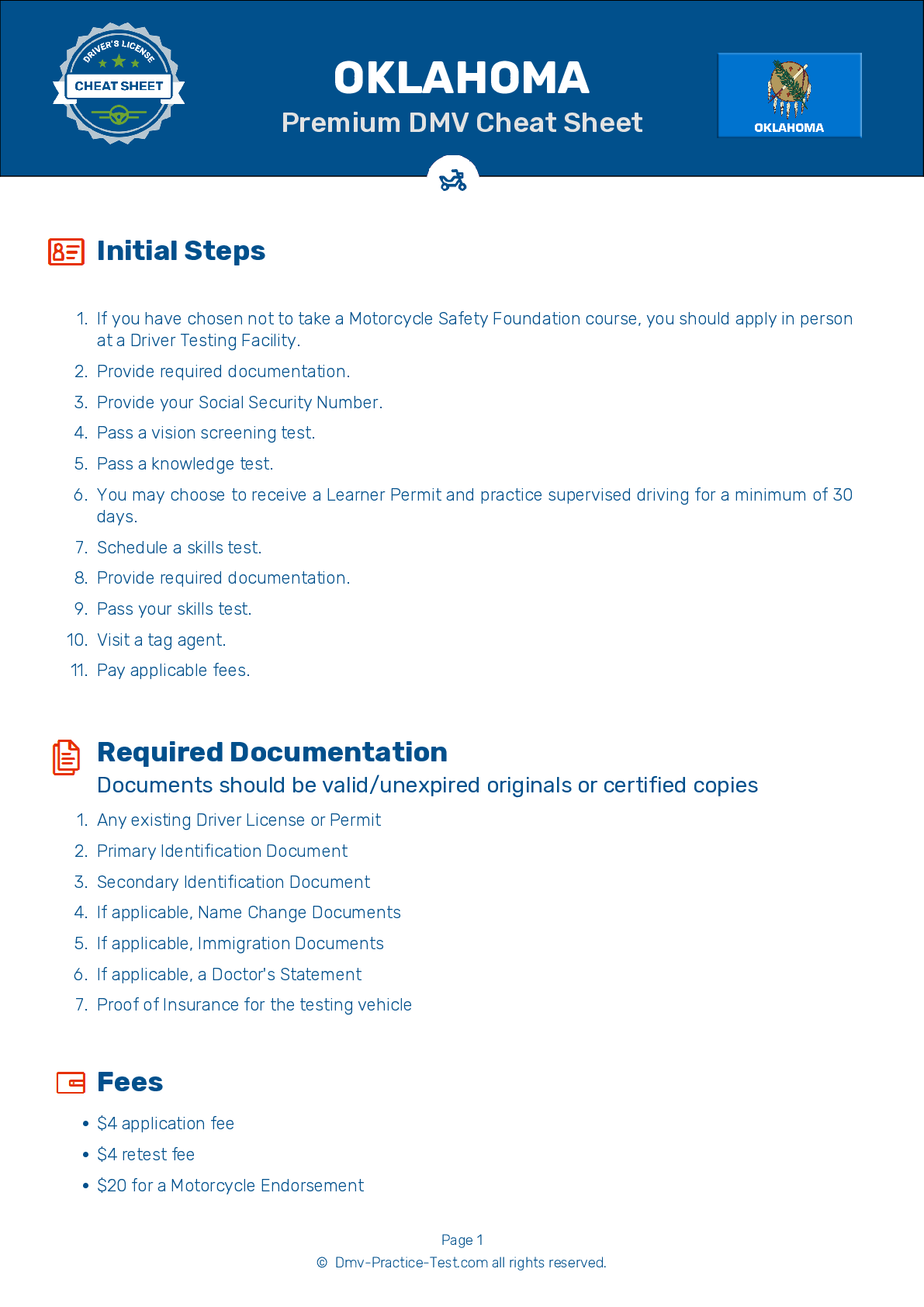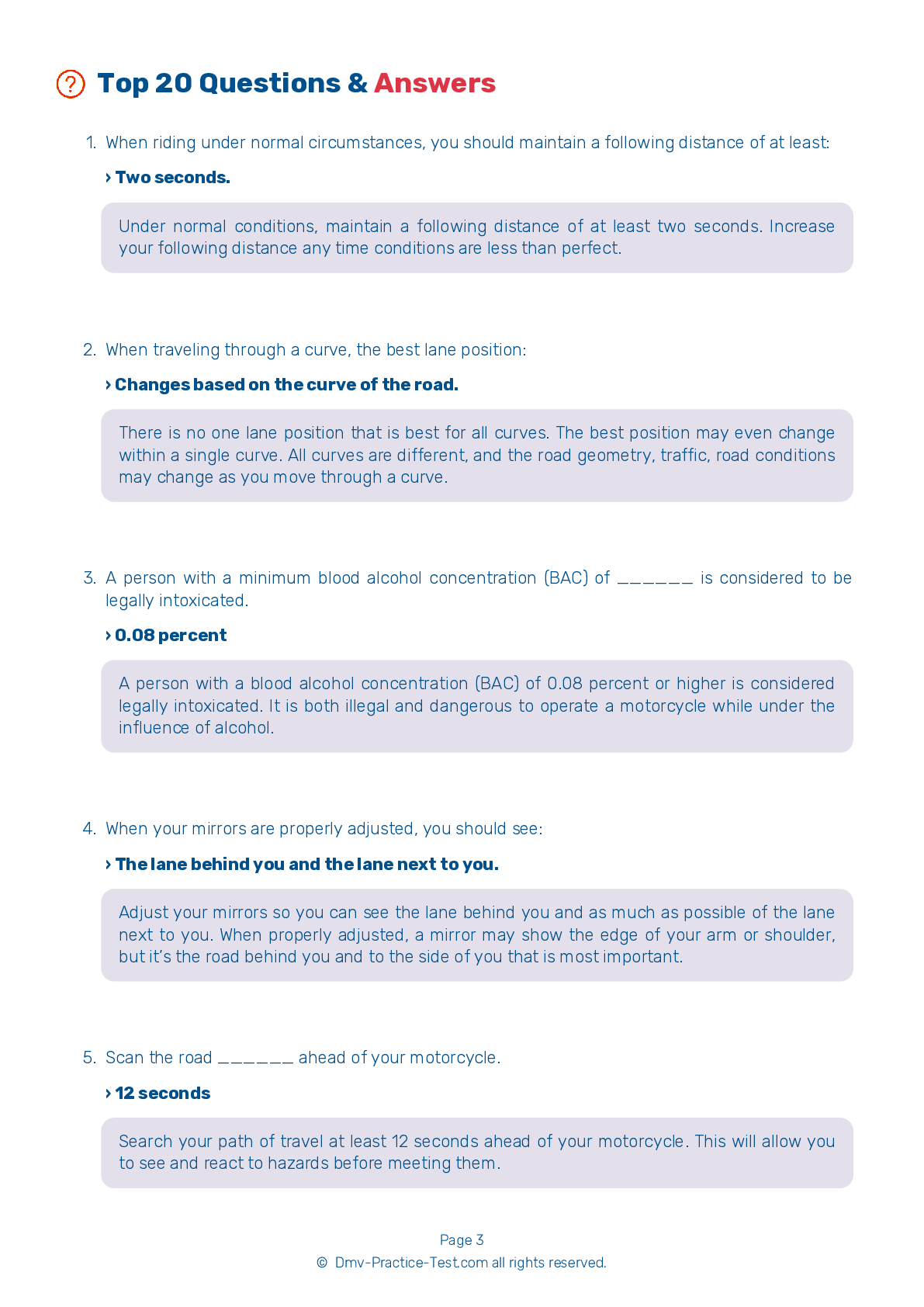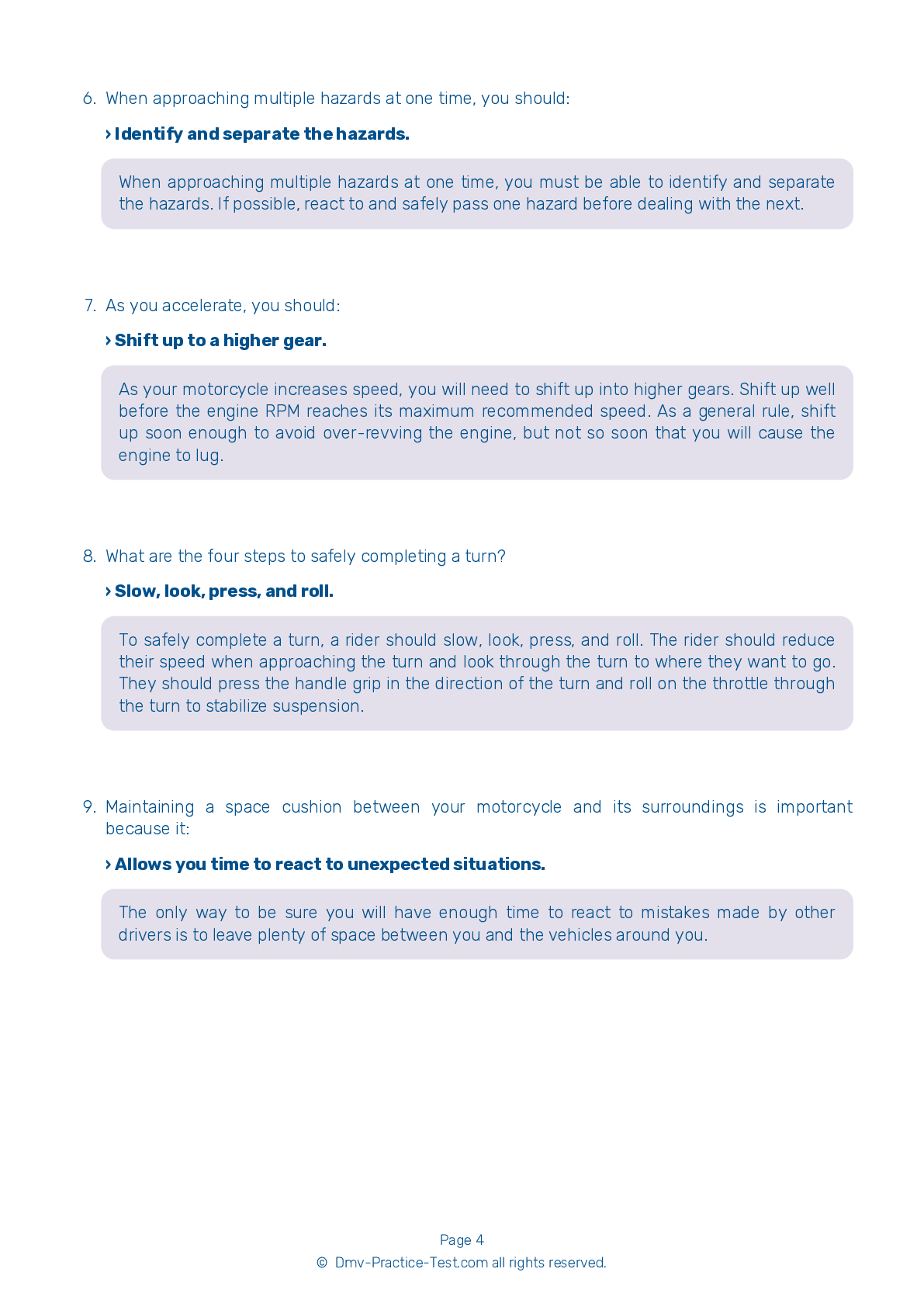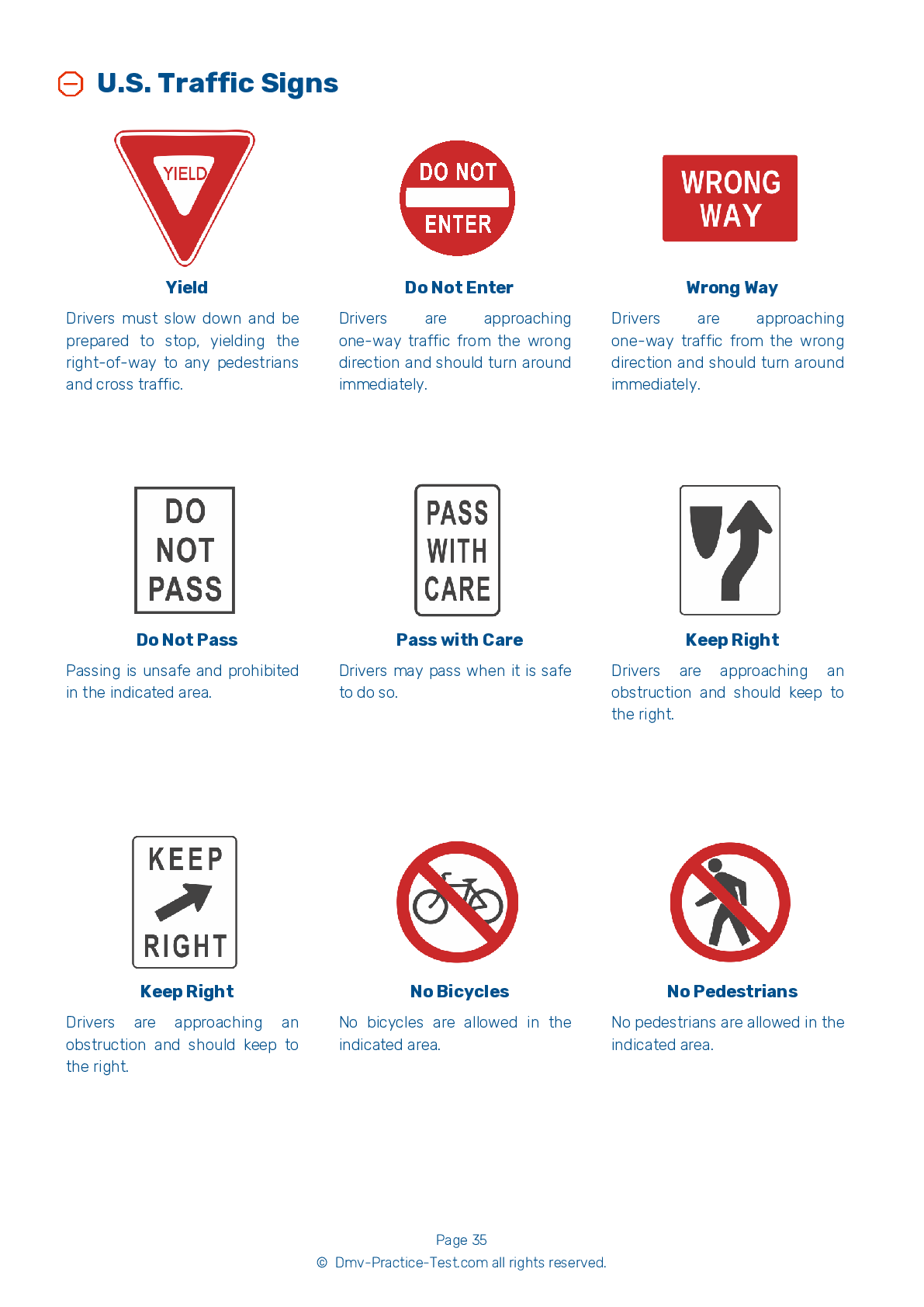DMV Permit Test #3
Motorcycle Test | License OK 2026 | FREE Online Practice! #3 Page 2 of 3
Take this FREE motorcycle test (license in OK 2026) to check your knowledge of the road rules. To improve your results, download a motorcycle handbook online, study theory, and practice for free on our website. Still worried about how to get a motorcycle license in Oklahoma in 2026? Check our website for more sample tests, train as much as possible, and boost your grades!
20
15
16
8 . When stopping, it is best to:
Only use the front brake.
For maximum straight-line braking, you should apply the brakes smoothly and firmly. As more weight transfers forward, more will be more traction available at the front wheel, allowing you to apply the front brake with progressively increasing force while reducing the pressure being used on the rear brake. Keep your knees against the gas tank and your eyes up to help keep yourself moving in a straight line.
9 . When a lead rider's left arm is bent at the elbow with their index and middle fingers pointing straight up, it means:
Speed up.
Hand signals are an important part of communication when riding in groups. When the lead rider's left arm is bent at the elbow with their index and middle fingers pointing straight up, it means the group should move into a double-file formation.
10 . A way to lower the risk of being involved in a crash is to:
Ride in the parts of a lane that make it difficult to be seen.
To reduce the risk of being involved in a crash, you should always ensure that you are visible to others. Communicate your intentions through proper use of your signals, brake light, and lane position. Maintain a space cushion around your motorcycle and consistently scan the road ahead of, behind, and next to your vehicle.
11 . When choosing clothes for riding, which of the following is not a good choice?
A baseball cap to cover your hair
To protect yourself against injury, you should wear a DOT-compliant helmet; face or eye protection; a jacket and long pants made of sturdy material; boots or shoes that are high and sturdy enough to cover and support your ankles; and gloves made of durable material.
12 . If you must brake and swerve to avoid a hazard, you should:
Not swerve and only use the front brake to stop.
If a hazard requires you to brake and swerve to avoid a collision, you should take the actions separately. Do not brake while swerving because doing so may cause your motorcycle to fall over.
13 . When parking a three-wheeled motorcycle on the side of the road, it should be:
Parked parallel to the curb.
Because of the limitations on mobility and motorcycle length, it is not practical to park your three-wheeled motorcycle on the side of a road at an angle with your rear wheel touching the curb, as you would with a two-wheeled motorcycle. Position your motorcycle in a parking space so you are parked parallel to the curb and set the parking brake.
14 . If your motorcycle starts to wobble, you should:
Downshift.
Do not try to accelerate out of a wobble because doing so will only make the motorcycle more unstable. Instead, grip the handlebars firmly, slow down by gradually closing the throttle, move your weight as far forward and downward as possible, and pull off the road as soon as you can. Avoid applying the brakes, as this may also worsen the wobble.
Need Motorcycle Insurance? No problem!
Compare the best rates in Oklahoma and find a personalized policy that meets your needs.
1. Are You Currently insured ?
2. Married ?
3. Do you own your Home?
4. Have you or a Family Member Honorably Served in U.S. Military ?
5. Your Name
6. Age
7. Zip code
Ranked by best match
2026 Oklahoma | Frequently Asked Questions
To acquire a motorcycle license in Oklahoma, you must first obtain a motorcycle learner's permit by passing a written exam. After practicing with the permit, you can apply for a motorcycle endorsement on your driver's license by passing a skills test. Alternatively, completion of an approved Motorcycle Safety Foundation course can waive the skills test requirement.
In Oklahoma, the minimum age to obtain a motorcycle license is 14. However, applicants under 18 are required to complete an approved Motorcycle Safety Foundation rider course. They must also have a signed consent from a parent or guardian and provide proof of school enrollment or graduation.
Yes, in Oklahoma, you need a dedicated motorcycle license or an endorsement on your regular driver's license to legally operate a motorcycle. To get this, you must pass a written test, a vision screening, and a motorcycle skills test. If you're under 18, you'll also need to complete a Motorcycle Safety Foundation rider course.
To apply for a motorcycle license in Oklahoma, you will need to provide proof of identity (like a birth certificate or passport), proof of Social Security number, and two proofs of Oklahoma residency. If you are under 18, you will also need a parent or guardian's signature on the application and proof of enrollment in school.
Yes, you will need to take a written exam to get a motorcycle license in Oklahoma. This test covers topics like traffic laws, safe riding techniques, and road signs. However, if you complete an approved Motorcycle Safety Foundation course, you can bypass this written test. Make sure to study the Oklahoma Motorcycle Operator's Manual before the exam.
The motorcycle written test in Oklahoma covers a range of topics including road rules, motorcycle laws, and safe riding practices. It also includes questions on identifying road signs, understanding motorcycle controls, handling emergencies, and dealing with hazardous conditions. The test is designed to assess your knowledge and understanding of operating a motorcycle safely.
Yes, in Oklahoma, you can substitute the written test for a motorcycle license with a Motorcycle Safety Foundation (MSF) Basic Rider Course. Upon successful completion of the course, you'll receive an MSF card, which the Oklahoma Department of Public Safety accepts as a waiver for the written test.
Enrolling in a motorcycle training course in Oklahoma involves a few steps. First, research approved courses in your area. Once you've chosen a course, you can usually register online or by phone. You'll need to provide personal information and pay a fee. Some courses require you to have a motorcycle learner's permit before enrolling, so check the specific requirements of the course.
No, you don't have to own a motorcycle to take the license test in Oklahoma. You can use any motorcycle that is insured, registered, and meets all safety requirements. However, it's important that you are familiar with the motorcycle and it fits your size and skill level for the test.
Yes, you can use a friend's motorcycle for the driver's license test in Oklahoma, as long as the vehicle is properly insured, registered, and meets all safety requirements. Remember to bring proof of insurance and registration to the test. The motorcycle should also be appropriate for your height and size.
Yes, the Oklahoma motorcycle driving exam tests specific handling skills. These include proper starting and stopping, turning and swerving, quick stops, and obstacle avoidance. The test also assesses your ability to balance at low speeds, signal appropriately, and maintain a safe distance from other vehicles. You'll need to demonstrate proficiency in these areas to pass the exam.
Yes, in Oklahoma, new motorcycle drivers under the age of 18 are subject to some restrictions. They are required to complete a Motorcycle Safety Foundation rider course and cannot carry passengers for the first six months after getting their license. They must also wear a helmet until they turn 18.
Yes, your Oklahoma motorcycle license is valid across all 50 states due to the Full Faith and Credit Clause of the U.S. Constitution. However, you must abide by the traffic laws of the state you are in, including helmet laws which can differ from Oklahoma's. Always check local regulations when traveling out of state.
In Oklahoma, only motorcycle operators and passengers under the age of 18 are required by law to wear a helmet. However, regardless of age, it's always a good idea to wear a helmet for safety reasons. Always ensure your helmet meets the Department of Transportation's standards.
Yes, in Oklahoma, there are two types of motorcycle licenses: a motorcycle-only license and a motorcycle endorsement on an existing driver's license. The type of license you choose depends on whether you want to drive only motorcycles or both motorcycles and other vehicles.
Yes, you can add supplementary endorsements to your motorcycle license in Oklahoma. These endorsements recognize additional skills like operating a commercial vehicle or school bus. To add an endorsement, you generally need to pass both a written test and a skills test. Check with the Oklahoma Department of Public Safety for specific requirements.
Yes, the Oklahoma Department of Public Safety provides the motorcycle license test in several languages other than English. However, it's advisable to contact your local testing center in advance to ensure that the test is available in your preferred language.
An effective strategy to prepare for the motorcycle license test in Oklahoma is to study the Oklahoma Motorcycle Operator Manual thoroughly. The manual covers all the information you'll need for the test. Additionally, taking online practice tests can be beneficial as they simulate the actual exam and help you identify areas that need further study.
Yes, the Oklahoma Department of Public Safety provides the motorcycle written exam in several languages other than English. However, it is recommended to contact your local testing center ahead of time to ensure that the test is available in your preferred language.
If you fail the motorcycle written test in Oklahoma, you can retake it. However, you must wait at least one day before attempting the test again. This allows you time to study and prepare to pass on your next attempt. There's no limit on how many times you can retake the test.



